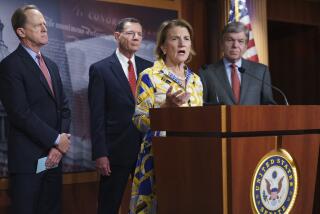Clinton Offers to Help Mediate Online Tax Issue
- Share via
WASHINGTON — President Clinton offered Monday to act as an intermediary between state governments and the high-tech industry to seek consensus on the politically sensitive issue of sales taxes on Internet commerce.
“We have good relations both with the state governments and with the high-tech industry,” White House spokesman Joe Lockhart said after a closed meeting between Clinton and the governors. “It’s something the president is willing to do.”
Technology issues--from e-commerce to the possibility of online voting in the future--were a dominant theme of the National Governors Assn. annual winter meeting in Washington. Disagreements among the governors, however, made it unlikely that the group would be able to come up with a definitive policy on Internet taxes.
Consumers enjoy the benefit of a tax moratorium on most Internet purchases. But traditional retailers and some governors and state legislators favor the imposition of sales taxes, citing unfair competition and the loss of potential public revenue.
Sales taxes remain the most important source of government financing at the state level, accounting for an average of 40% of revenue. However, they are increasingly regarded as archaic.
“The tax system administered by most state and local governments continues to reflect a 1930s economy,” said a staff report prepared for the governors. “The prospect of accelerating growth in retail electronic commerce may be the most visible long-term threat to the existing state-local tax structure. . . . Meeting this challenge may require a shift in how and what states tax.”
Emerging from the meeting with Clinton, Gov. Gray Davis said technology-driven economic growth is generating record revenue for states from income taxes and other levies, and it makes little sense to step in now with a sales tax.
“In the short term, I do not favor the application of a sales tax to the Internet, because I certainly don’t want to kill the goose that’s laying the egg,” Davis said. “I’m just trying to get the governors to understand the benefits of technology, the convenience it provides us, most of which is a taxable transaction reaping to their benefits.”
There is agreement among the governors and Clinton that the issue should be resolved at the state, rather than at the federal, level. In addition, Internet access taxes--the equivalent of tolls on highways--are widely seen as discriminatory and have little political support. Clinton’s future role in the issue might include sponsoring a summit that would bring the various parties together.
Aside from philosophical issues, any system of Internet taxation would encounter practical obstacles. There are huge differences from state to state in how sales taxes are applied. Some states do not tax food and clothing, for example.





